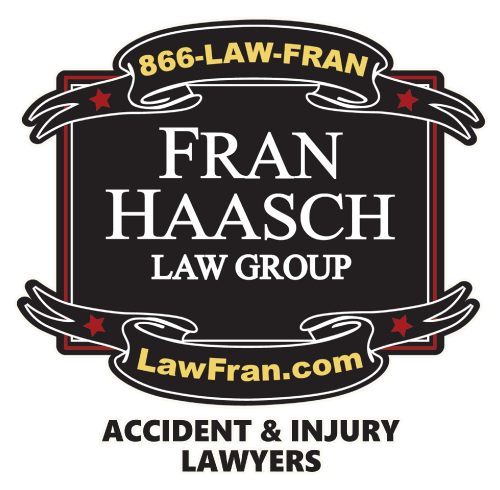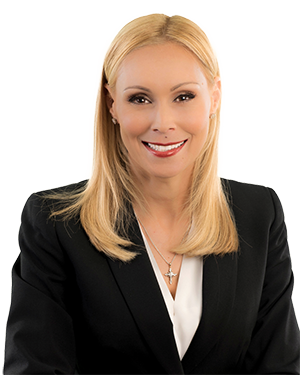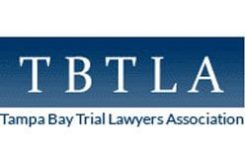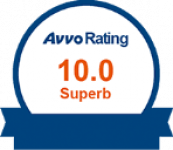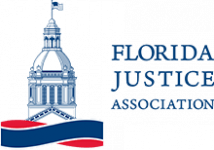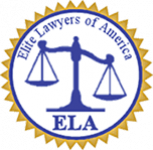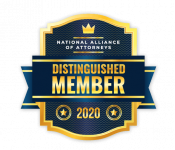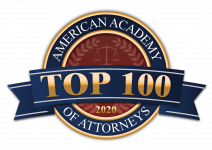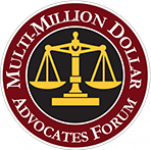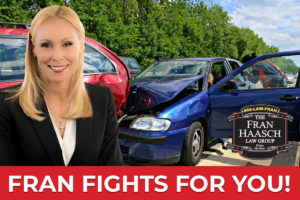There are nearly 600,000 motorcycle registrations in the state of Florida. The ‘Sunshine State’ is popular for many reasons, but especially for its nice year-round weather. There are also several motorcycle clubs and events that take place throughout Florida.
With so many motorcycles on the road, it’s no surprise that accidents are frequent in the state. In fact, in 2020, there were 8,037 motorcycle crashes in Florida, according to Florida Highway Safety and Motor Vehicles (FLHSMV), with 517 of those resulting in a fatality.
Most motorcycle accidents occur due to reckless motorists. If you live in Florida, you shouldn’t have to fear the roads because of their negligence. If you or a loved one has been seriously injured in a motorcycle accident in Florida, contact the motorcycle accident attorneys at Fran Haasch Law Group today to ensure your rights are upheld.
Steps to Take After a Motorcycle Accident in Florida
If you are a motorcyclist in Florida, it is important to know what to do after an accident. Too often, riders don’t take the necessary steps to protect their legal rights after a crash. This can lead to problems down the road.
Get to Safety
The first thing you should do after a motorcycle accident is to get to a safe location. If you can, move your bike to the side of the road. If you cannot do this, try to stay in one spot.
Contact the Police and File a Report
You should always contact the police after a motorcycle accident. This is important even if the accident seems minor. In Florida, leaving the scene before the police or help has arrived can lead to criminal charges.
Staying at the accident scene and filing a police report (usually with the Florida Highway Patrol) will also help establish what happened and who is at fault.
Seek Medical Treatment
Motorcycle accidents are often far more severe than car accidents. Riders have less protection from the road and may be thrown from their bike, causing serious injuries. As a result, it is important to seek medical treatment after a motorcycle accident, even if you don’t think you are seriously injured.
Some injuries, such as internal bleeding, may not be immediately apparent. A medical professional can properly assess your condition and provide the necessary treatment.
Get the Contact Information of All Parties Involved
Be sure to get the contact information of all parties involved in the accident, including the other driver, any witnesses, and any passengers. This will be important when it comes time to file a claim or speak with an attorney.
What Information Should I Collect?
There are certain pieces of information you should collect at the accident scene. This includes:
- The name, address, phone number, and insurance information of the other driver or vehicle owner, if they are not the same;
- The names and contact information of any witnesses;
- Photos of the accident scene, damage to your motorcycle, and your injuries;
- A copy of the police report.
Do Not Admit Fault for the Accident
We understand that accidents are extremely stressful. Your adrenaline may be pumping, and you may be confused about what happened. However, it is important not to admit fault for the accident at the scene or any insurance adjusters.
What you say after an accident can be used against you later. It is best to wait until you have had a chance to speak with an attorney before making any statements about who was at fault for the accident.
Speak with a Florida Motorcycle Accident Attorney
After taking care of the immediate aftermath of the accident, seek legal counsel from a Florida motorcycle accident attorney. An experienced attorney will be able to protect your legal rights, negotiate with the insurance company, and help you get the compensation you deserve.
At the Fran Haasch Law Group, we have years of experience helping motorcyclists throughout the Tampa Bay Area. We take a hands-on approach to every case and will fight to get you the best possible outcome.
Follow Your Doctor’s Treatment Plan
After a doctor has treated you, following their instructions and treatment plan is important. This may include taking medication, going to physical therapy, or getting rest.
Not following your doctor’s orders can hurt your case later. If you do not follow the recommended treatment plan, the insurance company may argue that your injuries are not as severe as you claim.
Do Not Give a Statement to the Other Driver’s Insurance Company
After a motorcycle accident, the other driver’s insurance company will likely contact you. The insurance company will use anything you say against you. They may ask you to give a recorded statement or sign some paperwork. It is important to avoid doing this. Wait for an attorney to review the documents before signing anything.
Do Not Accept a Quick Settlement Offer
The insurance company may also try to get you to accept a quick settlement offer. This is usually far less than what your claim is worth. Again, it is important to talk to an attorney before accepting any settlement offer.
Get Your Motorcycle Inspected
After a motorcycle accident, you should have your bike inspected by a qualified mechanic. This will help determine the damage’s extent and what repairs need to be made.
Keep Track of Your Expenses
After a motorcycle accident, you may have a lot of expenses. These can include medical bills, repair bills, and lost wages. Be sure to keep track of all your expenses. This will be helpful if you need to file a personal injury claim later on.
Motorcycle Insurance in Florida
Florida is one of few states that does not require riders to carry motorcycle insurance. However, the state requires you to have proof of financial responsibility if you get into an accident. There’s no way to predict when you’ll be in a crash, so if you don’t currently have a motorcycle insurance policy, now might be the time to get one.
If you do not want to get the motorcycle insurance, you can also:
- Get a Financial Responsibility Certificate from the Bureau of Motorist Compliances. To get this certificate, you’ll need to post a surety bond with a state-licensed company or deposit cash or securities with the Florida DMV.
- Get a Self-Insurance Certificate. Obtaining a self-insurance certificate requires you to provide proof that you can afford to cover the costs associated with an accident with your financial resources.
What Kind of Motorcycle Insurance Should I Get?
There are four main types of motorcycle insurance: liability, comprehensive, collision, and uninsured motorist (UM).
- Liability Coverage covers you if you are at fault for an accident. It will help pay for damages to the other person’s bike, property, and medical expenses.
- Comprehensive Coverage covers you for damage to your bike caused by things other than collisions. This includes things like vandalism, theft, and fire.
- Collision Coverage is for damage to your bike caused by a crash with another vehicle or object (like a tree). Collision coverage does not cover damages to the other person’s property or medical expenses.
- Uninsured Motorist Coverage protects the rider by paying for damage and injuries caused by an uninsured or underinsured driver.
What Happens If I Cause the Accident and Don’t Have Insurance?
If you are at fault for the accident and don’t have insurance, you may be liable for damages to other drivers and their vehicles. If the injured party sues you, you’ll also have to cover legal costs, which can be quite expensive.
The best way to protect yourself after an accident is to get motorcycle insurance, even if it’s not required. Bodily injury liability coverage will help cover expenses if you’re at fault for an accident and can’t afford to pay out of pocket.
Property damage liability will help cover the cost of repairing or replacing the other driver’s vehicle. Uninsured motorist coverage will protect you if the other driver doesn’t have insurance or flees the accident scene.
If you’re ever in doubt, it’s always best to speak with an attorney who can help you understand your rights and options.
The Importance of Going to the Hospital After a Florida Motorcycle Accident
Many accident victims choose not to go to the hospital after an accident because they don’t think their injuries are severe enough. But, it’s important to get checked out by a doctor as soon as possible after an accident, even if you don’t think you’re injured.
Some injuries, like concussions and whiplash, may not present symptoms until days or even weeks after the accident. A delay in seeking treatment can also be used against you if you decide to file a personal injury claim, without medical records that document any injury sustained due to the accident, the insurance company may argue that your injuries weren’t serious enough to warrant immediate medical attention or that your injuries resulted from an unrelated event.
It’s always best to err on the side of caution and go to the hospital after an accident. You can always cancel any tests or procedures that the doctors recommend if you decide you don’t want or need them.
What to Do If You’re in a Hit and Run Motorcycle Accident
If you’re involved in a hit-and-run motorcycle accident, it’s important to stay calm and get as much information about the other driver as possible.
If you have a camera on your helmet or bike, take pictures of the other driver’s license plate and vehicle. If there are any witnesses to the accident, get their names and contact information.
Then, call the police and file a report. Be sure to give them all your information about the other driver.
Finally, contact a motorcycle accident attorney. An experienced attorney can help you investigate the accident, file a police report, and deal with the insurance company. They can also help you file a UM/UIM claim to recover damages if the other driver is never found.
Filing a Personal Injury Claim After a Motorcycle Accident
A personal injury claim covers damages related to your physical and emotional injuries, such as medical bills and lost wages. If you were not at fault for the crash, then this type of insurance claim can be used to get compensation from the person responsible (usually their automobile insurance company).
If you are unsure which type of claim you should file after a motorcycle accident, contact an attorney for help.
What Damages Can I Recover After a Florida Motorcycle Accident?
The type and amount of compensation you may be entitled to after a motorcycle accident will depend on the specific facts of your case. Generally, however, accident victims can recover damages for their:
- Medical bills
- Lost wages
- Pain and suffering
- Emotional distress
- Property damage
An experienced motorcycle accident attorney will know how to investigate your case and build a strong claim for damages. They will also be able to negotiate with the insurance company on your behalf to help you get the full amount of compensation you deserve.
How to be Safe While Riding in Florida
Crash data compiled by the National Highway Traffic Safety Administration’s (NHTSA) Fatality Analysis Reporting System listed the top 10 deadliest roads in the US by the number of fatalities.
A whopping 5 of said roads are in Florida, with US-41 and I-75 in nearby Hillsborough County being two of them. A State Highway Safety Offices report shows that Florida had the highest number of fatal motorcycle accidents in the country in 2016 and 2017, leading all fifty states with 574.
At The Fran Haasch Law Group, we care about the safety of motorcycle riders on the road. Here are some tips to help you stay safe while riding in Florida:
- Wear a DOT-approved helmet
- Obey the speed limit
- Watch for other drivers, especially at intersections
- Use your turn signals
- Wear reflective gear
- Stay sober when you ride
- Avoid riding in bad weather if possible
Following these tips can help reduce your risk of being involved in a motorcycle accident. But even the most cautious riders can be involved in an accident beyond their control.
Contact The Fran Haasch Law Group today if you are in a motorcycle accident. Our experienced and dedicated team will fight for the compensation you deserve.
Why You Should Choose the Fran Haasch Law Group to Fight For You
The Fran Haasch Law Group lawyers have years of experience representing motorcycle accident victims.
Our Team Knows Motorcycle Law
Our motorcycle accident attorneys have years of experience handling motorcycle accident claims, and our law firm is heavily involved in the community of amazing bikers throughout the Tampa Bay area. We are involved with several motorcycle magazines and stay up to date on biking events in Florida, so we are current on the latest news affecting bikers.
We Will Fight for You
The motorcycle accident lawyers at the Fran Haasch Law Group have a proven record of standing up for injured motorcycle accident victims. We are proud to represent bikers throughout the Greater Tampa Bay Region, including Clearwater, Tampa, Palm Harbor, St. Petersburg, and beyond.
If you’ve suffered injuries from a collision that was someone else’s fault in Tampa Bay and its surrounding areas, you deserve to have your medical expenses and personal losses compensated. We are on your side and don’t collect a dime unless you receive compensation for your claim. Our injury lawyers will gladly provide you with a free case review and answer any questions about your case.
